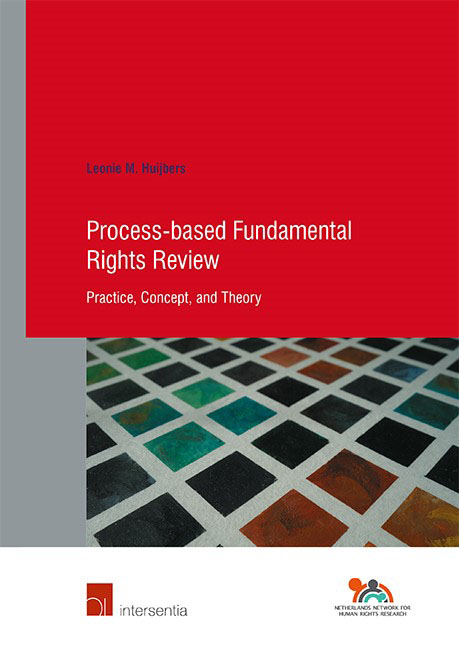Book contents
- Frontmatter
- Acknowledgments
- Contents
- List of Abbreviations
- INTRODUCTION
- PART I THE PRACTICE OF PROCESS-BASED FUNDAMENTAL RIGHTS REVIEW
- PART II THE CONCEPT OF PROCESS-BASED FUNDAMENTAL RIGHTS REVIEW
- PART III THE THEORY ON PROCESS-BASED FUNDAMENTAL RIGHTS REVIEW
- CONCLUSION
- Addendum: Questions for ECtHR Judges
- Summary
- Samenvatting
- Bibliography
- Official Documents
- Case-Law (by Jurisdiction)
- Case-Law (by Name)
- Curriculum vitae
- Human Rights Research Series
- Index
Addendum: Questions for ECtHR Judges
Published online by Cambridge University Press: 11 November 2021
- Frontmatter
- Acknowledgments
- Contents
- List of Abbreviations
- INTRODUCTION
- PART I THE PRACTICE OF PROCESS-BASED FUNDAMENTAL RIGHTS REVIEW
- PART II THE CONCEPT OF PROCESS-BASED FUNDAMENTAL RIGHTS REVIEW
- PART III THE THEORY ON PROCESS-BASED FUNDAMENTAL RIGHTS REVIEW
- CONCLUSION
- Addendum: Questions for ECtHR Judges
- Summary
- Samenvatting
- Bibliography
- Official Documents
- Case-Law (by Jurisdiction)
- Case-Law (by Name)
- Curriculum vitae
- Human Rights Research Series
- Index
Summary
In October 2017, the author met with nine judges of the ECtHR. In line with the judges’ wishes, these talks were anonymous, were not recorded, and have been used as background information only for the research underlying this book. In preparation for these meetings the author provided the judges with a list of questions that formed the background for the discussions. These questions are listed below.
A PROCEDURAL APPROACH
The ECtHR's use of process-based review has been noted by scholars and a procedural trend has been identified. Academics claim that the ECtHR is increasingly applying procedural reasoning, meaning that it focuses on the national decision-making procedures in its judgments, and looks increasingly into the quality, fairness or regulation of procedures of the national legislative, executive or judicial authorities.
a. In your view, what does process-based review mean?
b. Do you agree that there is a procedural trend in the case-law of the ECtHR?
c. If there is a procedural trend in the case-law of the ECtHR, in your view, in what manner does this procedural trend of the ECtHR manifest itself?
d. When do you think the ECtHR could fruitfully apply process-based review? E.g., in what kind of cases (e.g., politically sensitive cases, cases concerning legislative decision-making, cases about judicial decision-making)? Does it matter who the respondent State is (e.g., democratically well-developed States versus ‘illiberal democracies’)? Is it a prerequisite that parties to a case rely explicitly on the quality or lack of quality of the national decision-making procedure in their arguments?
e. How do you think the ECtHR should apply process-based review? E.g., in relation to what part of the judgment (e.g., margin of appreciation or proportionality)? Do you feel that the ECtHR can draw both positive and negative conclusions on the basis of process-based review and if so, to what extent? I.e., what weight do you think should be given to procedural arguments (e.g., decisive or merely supportive)?
f. In your view, what are important standards in judging the national decision-making process?
g. Do you think the standards that can be used in process-based review should be considered procedural requirements, i.e., requirements that are applicable to all national authorities in Europe?
- Type
- Chapter
- Information
- Process-based Fundamental Rights ReviewPractice, Concept, and Theory, pp. 397 - 400Publisher: IntersentiaPrint publication year: 2021

